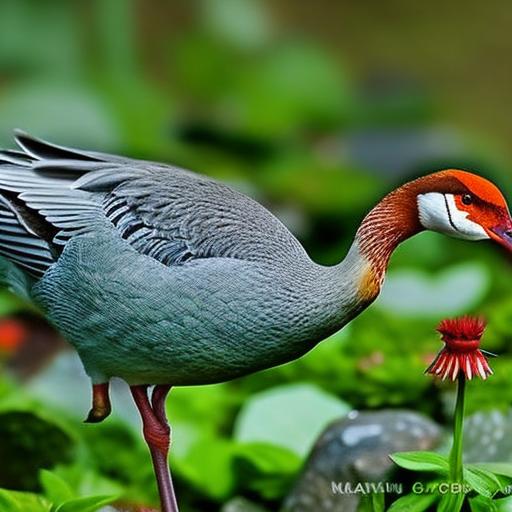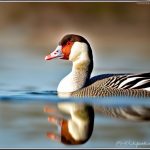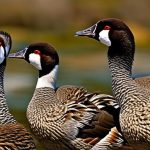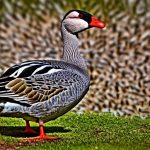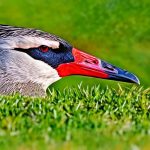Geese can be a beautiful sight, gracefully gliding across a pond or field. However, they can also be a nuisance, leaving behind droppings and causing damage to property. Many people turn to harmful chemicals or other methods to deter geese, but there is a natural and eco-friendly alternative: using plants. In this article, we will explore the benefits of using plants as a natural deterrent for geese and provide tips on how to effectively use this method.
Using natural methods instead of harmful chemicals has numerous benefits. Firstly, it is safer for the environment and wildlife. Chemicals can have negative effects on the ecosystem, harming not only the geese but also other animals and plants in the area. Secondly, natural methods are safer for humans and pets. Chemicals can pose health risks if ingested or inhaled, whereas plants are non-toxic and pose no harm to humans or animals. Lastly, using plants as a deterrent is a more sustainable option. Chemicals need to be reapplied regularly, whereas once plants are established, they can continue to repel geese year after year.
Key Takeaways
- Using plants is a natural and effective way to deter geese from your property.
- Understanding geese behavior is important in developing a successful plant-based deterrent strategy.
- Plant-based goose control has numerous benefits, including being environmentally friendly and cost-effective.
- Certain plants, such as tall grasses and prickly shrubs, are particularly effective in deterring geese.
- Proper planting and maintenance techniques, as well as monitoring and adjusting your strategy, are key to maximizing the effectiveness of plant-based goose control.
Understanding Geese Behavior
Geese can become a nuisance for several reasons. Firstly, they leave behind large amounts of droppings, which can be unsightly and unsanitary. These droppings can also damage property, such as walkways or lawns. Secondly, geese can be aggressive towards humans and pets if they feel threatened or if they are protecting their nests. This aggression can pose a safety risk, especially in areas with high human or pet traffic.
Understanding geese behavior is crucial in effectively deterring them. Geese are attracted to areas with open water, lush grass, and easy access to food sources. They are also social animals and tend to gather in large groups. Geese are creatures of habit and will return to areas where they have found food or nesting sites in the past. By understanding these behavior patterns, we can strategically use plants to deter geese from these areas.
Benefits of Using Plants
Using plants as a natural deterrent for geese has several benefits. Firstly, plants provide a visual barrier that can discourage geese from entering an area. Geese prefer open spaces where they can easily spot predators, so planting tall grasses or shrubs can make an area less attractive to them. Secondly, certain plants emit odors that are unpleasant to geese. By strategically planting these types of plants, we can create an environment that geese want to avoid. Lastly, plants provide a natural food source for geese. By planting specific types of plants that geese do not like to eat, we can reduce their attraction to an area.
Using plants as a deterrent is also a safe and eco-friendly option. Unlike chemicals, plants are non-toxic and do not pose any harm to humans or animals. They also do not have negative effects on the environment or other wildlife. Additionally, once plants are established, they require minimal maintenance and can continue to repel geese year after year.
Types of Plants
There are several types of plants that are effective in deterring geese. One popular option is tall grasses, such as switchgrass or big bluestem. These grasses provide a visual barrier and make it difficult for geese to spot predators. They also create an environment that is less attractive to geese, as they prefer open spaces.
Another effective plant is the yarrow plant. Yarrow emits a strong odor that is unpleasant to geese, making them less likely to enter an area where it is planted. Yarrow also has the added benefit of attracting beneficial insects, such as ladybugs and lacewings, which can help control other pests in the garden.
Other plants that are known to repel geese include lavender, rosemary, and marigolds. These plants emit strong odors that geese find unpleasant. Additionally, planting these types of plants can add beauty and fragrance to your garden.
Planting and Maintenance
When planting a garden to deter geese, it is important to consider the layout and design. Geese are attracted to open spaces, so creating barriers with tall grasses or shrubs can make an area less attractive to them. Planting in clusters or rows can also create visual barriers that discourage geese from entering an area.
Proper maintenance is key to ensuring the effectiveness of your plant-based goose deterrent. Regularly trimming and pruning plants will help maintain their visual barrier and prevent them from becoming overgrown. It is also important to remove any dead or dying plants, as these can attract geese rather than repel them.
Watering your plants regularly is also important, as healthy plants are more likely to repel geese. Geese are attracted to areas with lush grass and water sources, so keeping your plants well-watered will help create an environment that is less attractive to them.
Preventing Nesting

In addition to deterring geese from entering an area, plants can also be used to prevent geese from nesting on your property. Geese prefer areas with tall grasses or shrubs where they can build their nests and raise their young. By planting low-growing plants or groundcovers in these areas, we can make them less suitable for nesting.
Plants such as creeping juniper or creeping thyme are effective in preventing nesting. These low-growing plants create a dense groundcover that makes it difficult for geese to build their nests. They also provide a visual barrier that discourages geese from entering the area.
It is important to note that disturbing an active nest is illegal in many areas, so it is best to take preventative measures before geese have a chance to nest on your property.
Common Mistakes to Avoid
When using plants as a goose deterrent, there are some common mistakes that people make. One mistake is not planting enough plants or not planting them in the right locations. Geese are persistent creatures and will find a way around a small patch of plants. It is important to create a dense barrier that geese cannot easily penetrate.
Another mistake is not properly maintaining the plants. Overgrown or dying plants will not effectively deter geese and may even attract them. Regularly trimming and pruning plants will help maintain their effectiveness.
Lastly, it is important to be patient when using plants as a deterrent. It may take some time for the plants to establish and for the geese to learn to avoid the area. It is important to be consistent and persistent in your efforts.
Other Natural Methods
While using plants as a goose deterrent can be effective on its own, there are other natural methods that can be used in conjunction with plant-based strategies. One method is the use of decoys. Placing decoy predators, such as fake owls or coyotes, in the area can deter geese from entering. Geese are wary of predators and will avoid areas where they feel threatened.
Another method is the use of noise deterrents. Geese are sensitive to loud noises and will avoid areas where they hear unfamiliar sounds. Using devices such as wind chimes or motion-activated sprinklers can help deter geese from entering an area.
Monitoring and Adjusting
Monitoring and adjusting your plant strategy is crucial for maximum effectiveness. Geese are intelligent creatures and may find ways around your deterrents over time. It is important to regularly assess the effectiveness of your plant-based goose control and make adjustments as needed.
If you notice that geese are still entering an area despite your efforts, consider adding additional plants or changing the layout of your garden. It may also be helpful to combine plant-based strategies with other natural methods, such as decoys or noise deterrents.
Being flexible and adapting to changing circumstances is key in effectively deterring geese. Geese behavior can change depending on the season or other factors, so it is important to regularly assess and adjust your strategy.
Using plants as a natural deterrent for geese has numerous benefits. It is a safe and eco-friendly option that does not harm the environment or other wildlife. Plants provide a visual barrier and emit odors that are unpleasant to geese, making them less likely to enter an area. By strategically planting and maintaining a garden that repels geese, we can create a more enjoyable and pest-free environment. So why not give it a try and see the benefits for yourself?
If you’re interested in learning about natural ways to keep geese away from your garden, you might also find this article on breeding guinea fowl helpful. Guinea fowl are known to be excellent at deterring geese due to their loud calls and aggressive behavior. To learn more about when guinea fowl lay eggs and how to successfully breed them, check out this informative article: https://poultrywizard.com/breeding-guinea-fowl/when-do-guinea-fowl-lay-eggs/.
FAQs
What is the article about?
The article is about plants that can be used to keep geese away from certain areas.
Why do people want to keep geese away?
Geese can cause damage to property, leave droppings, and be aggressive towards humans.
What are some plants that can keep geese away?
Plants such as tall grasses, prickly shrubs, and plants with strong odors like lavender and rosemary can deter geese.
How do these plants keep geese away?
Tall grasses and prickly shrubs make it difficult for geese to walk and graze, while strong-smelling plants can be unpleasant for geese to be around.
Do these plants harm geese?
No, these plants do not harm geese. They simply make the area less appealing for them to be in.
Can these plants be used in any location?
No, these plants may not be suitable for all locations. It is important to consider factors such as climate, soil type, and sunlight when choosing plants to deter geese.
Meet Walter, the feathered-friend fanatic of Florida! Nestled in the sunshine state, Walter struts through life with his feathered companions, clucking his way to happiness. With a coop that’s fancier than a five-star hotel, he’s the Don Juan of the chicken world. When he’s not teaching his hens to do the cha-cha, you’ll find him in a heated debate with his prized rooster, Sir Clucks-a-Lot. Walter’s poultry passion is no yolk; he’s the sunny-side-up guy you never knew you needed in your flock of friends!

